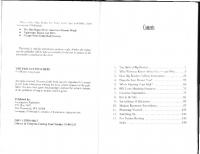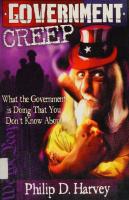The Privacy Poachers: How the Government and Big Corporations Gather, Use and Sell Information About You 1559500867, 9781559500869
Tony Lesce. The Privacy Poachers: How the Government and Big Corporations Gather, Use and Sell Information About You. Lo
168 84 47MB
English Pages 155 [82] Year 1992
Recommend Papers

- Author / Uploaded
- Tony Lesce
File loading please wait...
Citation preview
J( 5,i (. z Lt 9"
luv
t?qz
The Privacy Poachers How The Gouernmentand Big Corporalions Gather, Use and Sell lnformation AboutYou
Tony Lesce / t'
II f
i
W
Loompanics Unlimited Port Townsend, Washington
'I'hcsc
rthcr fine books by Tony Lcsce are available from
l.txrnrpanics Unlimited:
. o o
rhls
Contents
Thc Big House: How American prisons Work Espionage: Down and
Dirty
Escape from Controlled Custody
bo2ty is sold
for information
purposes onry. Neither the author
nor the publisher wilr be herd accouitobt" yo, thi use o, information contained in this book.
*tiii ifin"
THE PRIVACY POACHERS
a
1992 by Tony Lesce
All rights reserved. No part of this book may be reproduced or stored
i1 any form wharsoevei without the prior *ritt.n;";r",rr;;ir. p"ulisher. Revie:vs mal quote brief p^rug.r without ttre written lo,isent or rne pubt$her as long as proper credit is given. Published by: Loompanics Unlimited P.O. Box I197 Port Townsend, WA 98368 Loompanics Unlimited is a division of Loompanics Enterprises, Inc.
rsBN l-5s9s0-086_7 Library of Congress Catalog Card Numb er 92_0g1233
1.
The Birth of Big
Brother
..
. .I
2. Who Wants to Know About You - and Why .......5 3. How Big Brother Collects Information ........23 . . . . . .55 4. Does the Law Protect You? ......69 5. Who's Opening Your Mail? ....73 6. IRS Cross-Matching Programs ......77 7. UniversalRegistration .......81 8. Eye in the Sky 9. SurveillanceofBusinesses... .....85 10. ModernElectronicSurveillance .........87 11. ProtectingYourself .......111 ....143 12. Summing Up... .. . . . .145 13. For Further Reading
Index
..149
The
Birth of Big Brothcr I
Ihe Birth of Big Brother
George Orwell's novel, 1984, dealt with a little man, an average citizen being morally and intellectually strangled by a monstrous government tyranny personified by the leader, "Big Brother." This government had a monopoly on power, unlike reality today, several years after thc real-life year 1984 has come and gone. Today, we have a variety of police and regulatory agencies ruling our lives and collecting information about us. There are also private agencics and bureaus intruding into our privacy. Official police at local, state, and federal levels employ 600,000 people, with total budgets of about $30 billion. Private security agencies alone have an estimated l.l million people employed, according to an estimate on page 4l of the March, 1991 issue of the security industry magazine, Security Management. Another estimate, quoted in the November 15, 1991 issue of Law Enforcement News, states that private security employs 1.5 million persons, with an annual budget of $52 billion. Add to these the many credit bureaus, insurance company employees, medical record-keepers, and assorted state and private bureaucrats, and we have a number as formidable as it is impossible
2 ilil,t PRtvA('y
t,
prn
POACHERS
d.wn. Today, the individual
The
stands alone against a hun-
tlrt'tl .r l thousand Big Brothers, hacking away at his'freedom. W.rsc, thc annual growth rate of private security is about g%, twicc that of official law enforcement, according to an editorial by llrucc Cameron in the December, 1991, issue of Law and ( )nlcr magazine. 'l"he 20th Century has brought about new and unprecedented
thrcats to individual freedom, especially in the united states. Hcre, many people think that they're much freer than they are in reality. If you deeply believe that you have certain inalienable rights as an American, you'll find some nasty surprises within these pages. You'll find that some rights, which are so taken for granted that they're not enumerated in the constitution, are being infringed upon both in the name of corporate profit and govcrnment control. America traditionally was "the land of the free," but from the start, government was developing a heavy hand to use on its citizens. shortly after the Revolution, the "whiskey Rebellion', broke out over the right of farmers and brewers to produce their distillate without intervention and taxation uy ttre federal government. The government won, although hill people con_ tinue to brew and distill on a small scale up to the piesent day.
The l9th Century offered many more opportunities for people who cherished their freedom and who wanted to remain free, to migrate west and make new starts. while the frontier
was still open, people wishing to escape the crowding and rcgimentation of the East could find freedom in the wide-open spaces. The frontier was relatively safe, and despite the lack of profuse crime statistics, it is plain to see that the danger from nrarauding Indians was far less than from present-day street gangs in Eastern cities such as New york. Even Dodge City and 'l'.nrhst'ne were not as wild as the waterfront distriCts of l:.stcrr citics, where hijack gangs and river pirates abounded.
Birth of Big
Rnlhrr
I
More importantly, people were far from the heavy hand of government regulation. During the 20th Century, while some Europeans were expressing concern over the Americanization of Europe, a more subtle and insidious process happened: the Europeanization of America. While Europeans were agonizing over the introduction of the "Coca-Cola culture" into their homelands, Americans found their lives increasingly controlled and regimented. As long ago as the Civil War, the government had introduced a European practice: conscription. Draft boards registered all males of military age during both World Wars, the Korean, and the Vietnamese Wars. Each male was required to carry his draft card at all times, and this card served as a means of identification.
War required information about the enemy, and during the Civil War the U.S. Secret Service began under its first chief, Alan Pinkerton. The Secret Service and its sister agency, the latearriving Federal Bureau of Investigation, continued the peacetime surveillance of American residents to root out "subversion." Spying upon citizens became routine, although the small size of the agencies limited their ability. After World War II, both agencies enlarged to an unprecedented degree in peacetime, because of the cold war. Electronic data processing made it possible to keep tabs on millions of people quickly and efficiently, with small staffs.
In 1913, the income tax arrived, and at first few were worried didn't earn enough to be subject to the tax. This
because they
soon changed, and today the Treasury Department's lnternal Revenue Service, more than any other government agency, is playing "Big Brother" to many Americans. A draft board can't do much without a draft, but the IRS goes on forever because practically every wage-earner pays income tax today. The Treasury Department got further into the act during prohibition, when a special unit, the "Untouchables," took to the field against Al Capone and other bootleggers. The Treasury's
I
I
ilt, I'1il\,\( \ t\)A('iltiRs
W
ho ll'onl: lo Know Aboul
You
and
Why
5
,,\lt,lr,l,'l.blrcco, and Firearms Bureau
imposes taxes and rrrrnulircturing, importation, and sales in all three lr.ltl:' wlrilc ATF agents have performed valuable services in t:rr1rt'tirrg .r'rred criminals, especially with their "Achilles" l)r()l"rilnls, nrOst agents' efforts are spent in enforcing nit-picking ,lrst'rvrurce of technicalities by legitirnate gun dealers and fire;rr rrrs lrobbyists. The truth is that enforcing procedural violations rrg'inst law-abiding citizens is far less dangerous than raiding ;rr lncd criminals. rr^11rrl;rr.s
A unit of the U.S. Department of Justice has also become vt'r.y intrusive, in its guise of fighting drug use. Originally t'stirblishcd as the Federal Bureau of Narcotics, its name and irriti,ls changed through the years, copying the style of the Soviet Sccrct Police. The "FBN" became the'.BNDD," the Bureau of Nirrcotics and Dangerous Drugs, and then the ..DEA,,' the Drug lrnkrrccment Administration. with each name change, its power rrrrd inlluence increased. Skillful propaganda hai convinced ilrilny pcople that illegal drugs are the greatest threat in Amcrican history, justifying extreme measures. Drug use has rrow taken the place of Communism as the bogeyman of the |
990s.
The greatest dangers, however, come from events outside of public view. All government agencies maintain computer files, :r,d despite Congressional resistance, agencies begin sharing thcir files during the 1970s. Although congress has not allowed thc integration of distinct files into national databases, it's been lr.ppening under the table. Privately-compiled and maintained computer dossiers, such as those put together by the direct_ rnarketing and credit industries, contain even more information rrh.ut you, and their use is, in practice, beyond the reach of law.
lVho lYants to l(now AboutYou
- md \Yhv t)
Big Brotherism. the imposition ol' total control over one's fellow man, attracts certain kinds ol'pcople. What kinds? Obviously the ones who like to control others. Such people are attractcd to policc work, as are those who like to avenge wrongs and othcrs who seek adventure. Avengers and adventurers can find legitimate places in law enforcement, but controllers who drift into law enforcement often end up making life miserable for thc:ir fcllow man. Adventurers often join S.W.A.T. teams, where they get opportunities to go through doors and fight it out with the bad guys. Avengers who get into criminal investigation can unravel bizarre and puzzling crimes, to bring the perpetrators to justice. Controllers, by contrast, don't really care about the dangerous or exacting aspects of law enforcement. Going after armed desperadoes is dangerous, because they sometimes open fire against police officers. It's safer to target legitimate citizens, because they don't shoot back. Big Brothers are always bureaucrats who have job tenure, not elected politicians. Politicians have better things to do, such as
(r
'l lll,,
I'lllV4('Y
POACIIERS
(:ollr(:tingi campaign funds, paying back favors, and keeping high
pnrl'ilt:s so that they may be re-elected. The controllers are nnonynlous, and their job tenure doesn't depend on re-election cvcry l'cw years. Many work for private agencies and bureaus, ilnonyntously, collecting information and controlling the lives of pcoplc thcy never see, and who may not even know the controllcrs cxist.
Victimless Crimes One way the Big Brother mentality shows itself is by creating victimless crimes, "offenses against morality," which serve as levers for control and prosecution. Many local "blue laws," such as Boston's ban on shining shoes on Sundays, have appeared, and are today either ignored because of their ridiculousness, or wiped off the books when legislatures revise penal codes. In New York State, for example, until the new penal code appeared in 1965, teenage masturbation was illegal. This was obviously not cnforced, or the jails would have been full of adolescent onanists. On the federal level, there have been serious encroachments









